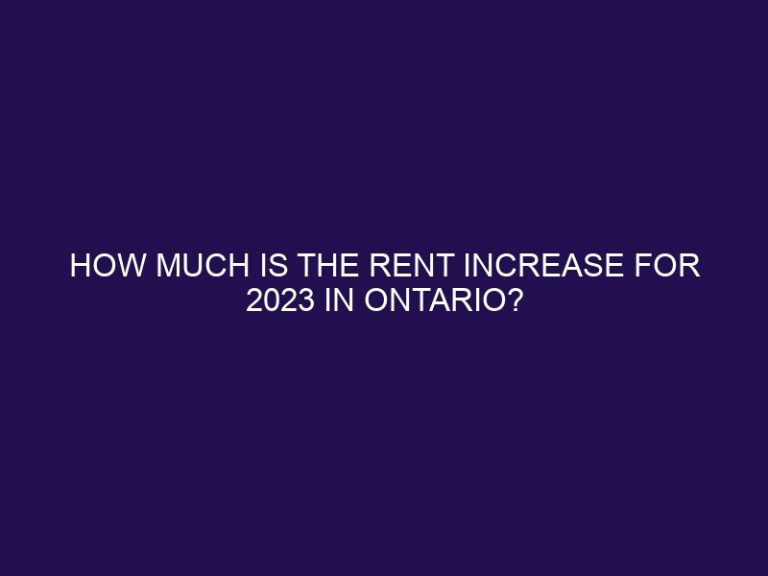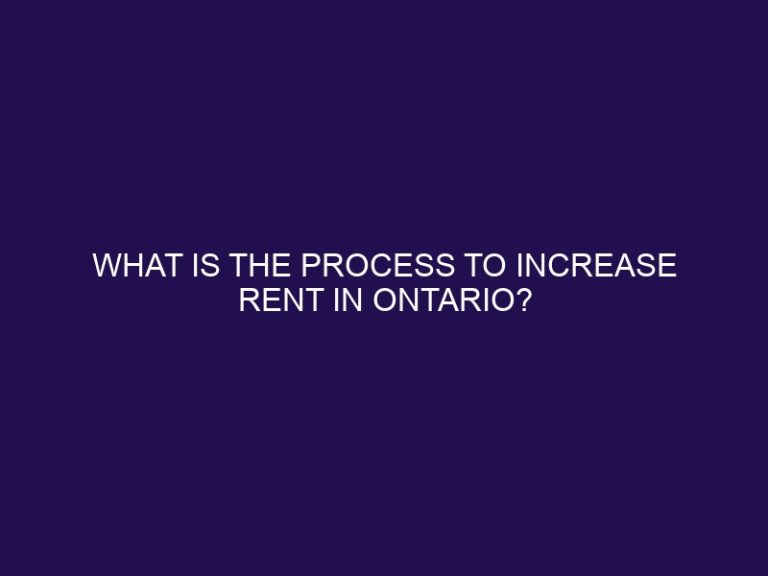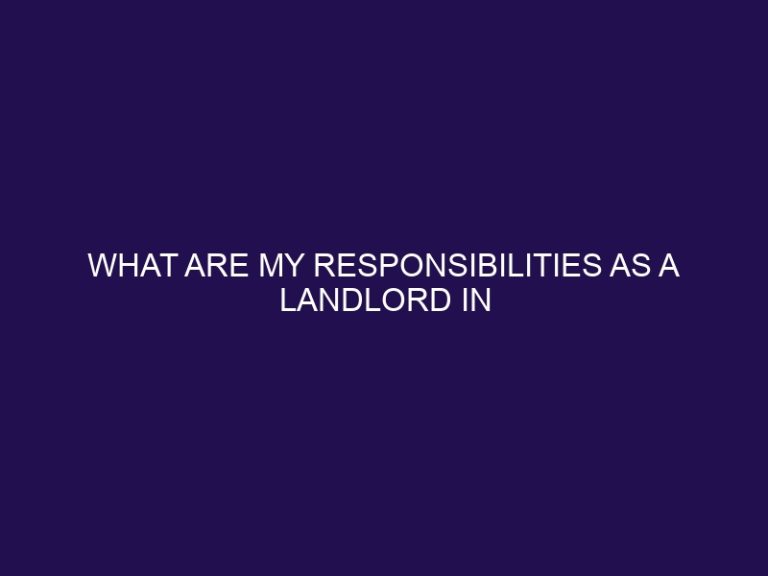What are my rights as a landlord in Quebec?
.jpg)
Being a landlord in Quebec comes with both rights and responsibilities. It is important to understand your rights as a landlord to ensure a smooth and legally compliant rental experience. In Quebec, landlord rights can be summarized in three main areas:
1. Right to Collect Rent: As a landlord, you have the right to collect rent from your tenants, typically in accordance with the agreed-upon terms outlined in the lease agreement.
2. Right to Set Rental Terms: You have the right to establish rental terms, including the duration of the lease, the amount of rent, and any additional conditions or rules that tenants must follow.
3. Right to Evict Tenants: In certain circumstances, such as non-payment of rent or violation of lease terms, landlords in Quebec have the right to initiate eviction proceedings to regain possession of the property.
In addition to these rights, landlords in Quebec also have legal obligations that must be fulfilled. These obligations include:
1. Providing a Safe and Habitable Property: It is the landlord’s responsibility to ensure that the rental property is safe, meets health and safety regulations, and provides a habitable living environment for tenants.
2. Respecting Tenant Privacy: Landlords must respect tenant privacy and can only enter the rental unit under specific circumstances, such as for maintenance or emergency repairs, with proper notice, or in the event of an emergency.
3. Maintaining the Property: Landlords are responsible for maintaining the property and ensuring that it is in good repair. This includes addressing repairs promptly and keeping the property in compliance with building codes and regulations.
Apart from these general rights and obligations, understanding your rights and responsibilities regarding rent, repairs, maintenance, and ending a tenancy is crucial. This includes setting the rent, handling rent increases, addressing late rent payments, responding to repair requests, managing emergency repairs, and following the proper procedures for ending a tenancy and re-renting the property.
By familiarizing yourself with your rights as a landlord in Quebec and fulfilling your legal obligations, you can navigate the rental process confidently and ensure a positive and mutually beneficial landlord-tenant relationship.
Key takeaways:
- Landlords in Quebec have the right to collect rent from their tenants.
- Landlords have the right to set rental terms, including lease agreements and conditions.
- Landlords in Quebec have the right to evict tenants under certain circumstances, such as non-payment of rent or violation of the lease agreement.
Landlord Rights in Quebec
In the province of Quebec, being a landlord comes with a unique set of rights that you should be aware of. In this section, we’ll delve into the various aspects of landlord rights that are specifically applicable in Quebec. From the right to collect rent and set rental terms, to the crucial right to evict tenants when necessary, we’ll explore what these rights entail and how they can impact your role as a landlord. So, buckle up and let’s navigate through the landlord rights in Quebec together!
1. Right to Collect Rent
As a landlord in Quebec, you have the right to collect rent from your tenants. Here are some key points to consider:
- Payment Method: Determine how you want tenants to pay rent, whether it’s through cash, check, or electronic transfer.
- Rent Amount: Establish a fair and reasonable rent amount based on factors like market rates, property condition, and included amenities.
- Rent Due Date: Specify the due date for rent payment, typically at the beginning of the month.
- Late Payment Policy: Clearly outline consequences for late payments, such as fees or potential eviction.
Fact: In Quebec, landlords can request a security deposit of up to one month’s rent to cover any damages or unpaid rent.
2. Right to Set Rental Terms
The right to set rental terms is an essential aspect of the landlord-tenant relationship in Quebec. Landlords possess the authority to establish the terms and conditions of the lease agreement. This includes determining the monthly rent, selecting the duration of the lease, and specifying any additional conditions or restrictions. It is crucial for landlords to comply with the legal framework and guidelines established by the Residential Tenancies Act. Pro-tip: Prior to setting rental terms, it is advisable to familiarize yourself with the local rental market to ensure that your rates are competitive and fair.
3. Right to Evict Tenants
In Quebec, landlords have the right to evict tenants under specific circumstances. Here are the key details regarding this right:
– Non-payment of rent: If tenants fail to pay rent on time, landlords have the right to evict them.
– Lease violations: Landlords can evict tenants if they violate the terms of the lease agreement, such as causing damage to the property or engaging in illegal activities.
– End of lease: Once a lease agreement has expired, landlords can choose not to renew it and proceed with eviction if necessary.
It is important to note that landlords must exercise their right to evict tenants in accordance with the legal process and provide tenants with proper notice before taking any eviction action.
Legal Obligations of Landlords in Quebec
Curious about your rights as a landlord in Quebec? Let’s dive into the legal obligations that come with being a landlord in this province. We’ll explore key areas such as providing a safe and habitable property for your tenants, respecting their privacy, and maintaining the property to ensure a positive renting experience. So, whether you’re a seasoned landlord or just getting started, understanding these obligations is crucial. Let’s get started and empower you with the knowledge you need.
1. Providing a Safe and Habitable Property
Landlords in Quebec are legally obligated to provide tenants with a safe and habitable property in order to meet health and safety standards. This means guaranteeing that the property is free from any hazards, such as mold or structural issues. It is also important for landlords to furnish amenities and utilities necessary for basic living conditions, including heat, hot water, and electricity. Additionally, performing regular maintenance and repairs promptly is crucial in ensuring the habitability of the property. A helpful tip is to conduct regular inspections and promptly address any concerns raised by tenants to maintain a safe and habitable environment.
2. Respecting Tenant Privacy
Respecting tenant privacy is an essential legal obligation for landlords in Quebec. Here are some guidelines to follow:
- To respect tenant privacy, always obtain the tenant’s consent before entering their rental unit, except for emergencies.
- Ensure you provide reasonable written notice, typically 24 hours in advance, before entering the premises.
- Respecting boundaries is crucial, so avoid unnecessary intrusion into the tenant’s personal space and belongings.
- Understand that using video or audio surveillance without the tenant’s knowledge and consent is forbidden. So, refrain from such actions.
- Make sure to handle the tenant’s personal information with care, protecting it and maintaining confidentiality at all times.
Pro-tip: Cultivating a respectful and open line of communication with your tenants can significantly contribute to fostering a positive and trusting landlord-tenant relationship.
3. Maintaining the Property
Maintaining the property as a landlord in Quebec entails certain responsibilities outlined by the law. Here are some key steps to follow:
1. Regular Inspections: To maintain the property, it is important to conduct routine inspections. This will help identify any maintenance or repair needs that may arise.
2. Prompt Repairs: It is essential to promptly address tenant-reported issues and ensure that repairs are completed in a timely manner. This will help maintain the property’s condition and keep tenants satisfied.
3. Preventive Maintenance: Taking proactive measures is crucial in maintaining the property. This can include regular pest control or HVAC system maintenance to prevent potential damage or deterioration.
4. Lawn and Landscape Care: The exterior of the property should be well maintained. This involves ensuring proper lawn care, snow removal, and regular landscaping upkeep.
5. Common Area Cleaning: Regularly cleaning and maintaining common areas like hallways, staircases, and laundry facilities is necessary. This helps create a pleasant living environment for tenants.
6. Safety Measures: Installing and regularly testing smoke detectors, carbon monoxide detectors, and other safety devices required by law is important. This ensures the safety of tenants and complies with regulations.
7. Compliance with Building Codes: It is crucial to stay updated on and comply with all relevant building codes and regulations. This helps maintain the property’s safety and legality.
8. Records and Documentation: Keeping detailed records of maintenance activities, repairs, inspections, and communication with tenants is essential. This helps track the property’s maintenance history and protects both the landlord and tenants.
Remember, maintaining the property requires consistent effort and attention. By following these steps, you can ensure the property remains in good condition and meets all legal requirements.
Rights and Responsibilities Regarding Rent
When it comes to being a landlord in Quebec, it’s crucial to know your rights and responsibilities regarding rent. In this section, we’ll dive into the nitty-gritty details of setting the rent, dealing with rent increases, and handling late rent payments. So, if you’re looking to navigate the complex world of tenant payments and ensure you’re on solid ground, you’ve come to the right place. Let’s explore your rights and how to handle them like a pro.
1. Setting the Rent
When setting the rent as a landlord in Quebec, it is important to consider several factors. Here are some essential points to keep in mind:
- Determine a reasonable and competitive rental rate based on the prevailing market conditions.
- Take into account the property’s location and condition when establishing the rent.
- Consider any additional amenities or features that may justify a higher rental amount.
- Ensure that the rent adheres to the legal regulations and guidelines set by the Rental Board of Quebec.
- Clearly communicate the rent amount to tenants and include it in the lease agreement.
- Remember that there are limitations on rent increases, and you must follow the proper notice period.
- Regularly review and adjust the rent, if necessary, while staying within the legal limits and guidelines.
2. Rent Increases
Rent increases are a common concern for landlords in Quebec. Here are some key points to consider when it comes to rent increases:
- Legal regulations: Landlords in Quebec are allowed to increase the rent once every 12 months, as long as they provide proper notice to the tenant.
- Maximum allowed increase: The rental board sets a limit on the maximum percentage by which landlords can increase the rent each year. This percentage changes annually.
- Notice period: Landlords must provide tenants with a written notice at least three months before the proposed increase takes effect.
- Valid reasons: Rent increases must be justified by valid reasons, such as increases in municipal taxes or improvements made to the property.
Remember to always check the latest regulations and communicate openly with your tenants about rent increases to maintain a positive landlord-tenant relationship.
3. Late Rent Payments
Late rent payments, especially in Quebec, can present a challenge for landlords. In order to address this issue effectively, follow these steps:
- Step 1: Review the lease agreement carefully to ensure that the tenant fully comprehends the consequences that come with making late rent payments.
- Step 2: Deliver a written notice to the tenant, clearly stating the amount owed, the due date, and any applicable late fees.
- Step 3: Engage in open communication with the tenant to discuss the reasons behind the delay in payment and explore potential solutions.
- Step 4: Consider the possibility of negotiating a payment plan or establishing an automatic payment system that works for both parties.
- Step 5: If necessary, take legal action by filing a complaint with the rental board to resolve the matter.
Always remember, maintaining open communication and striving to find mutually beneficial solutions are key in effectively dealing with late rent payments.
Rights and Responsibilities Regarding Repairs and Maintenance
As a landlord in Quebec, understanding your rights and responsibilities regarding repairs and maintenance is crucial. In this section, we’ll dive into the nitty-gritty details of how to handle repair requests from tenants, dealing with emergency repairs, and navigating renovations and upgrades. It’s important to know what you’re entitled to as a landlord, while also ensuring the well-being and satisfaction of your tenants. So let’s explore this realm of landlordship and equip you with the knowledge you need to confidently manage your properties.
1. Responding to Repair Requests
“`
- Responding to Repair Requests: When it comes to responding to repair requests as a landlord in Quebec, it is crucial to prioritize prompt action.
- Evaluate the Urgency: Assess the urgency of the repair and prioritize accordingly to ensure timely resolution.
- Notify the Tenant: Communicate with the tenant promptly, informing them of the timeline for repairs and any necessary access to the property.
- Arrange for Qualified Professionals: Make arrangements for a qualified professional or contractor who can effectively complete the necessary repairs.
- Maintain Detailed Records: Ensure to keep comprehensive records of all communication and actions taken, ensuring transparency and documentation.
Fact: In Quebec, landlords are legally obliged to respond to repair requests in a timely manner, ensuring the property remains safe and habitable for tenants.
2. Emergency Repairs
- When it comes to emergency repairs as a landlord in Quebec, it is crucial to prioritize prompt action to ensure the safety and well-being of your tenants. Here are the steps you need to follow:
- Assess the situation: Evaluate the seriousness of the emergency and determine whether it poses an immediate threat to the tenants or the property.
- Notify the tenant: Inform the tenant about the emergency repairs and provide clear instructions on what they should do to ensure their safety.
- Contact emergency services: If required, promptly call the relevant emergency services, such as the fire department or paramedics.
- Arrange for emergency repairs: Take swift action by contacting qualified professionals or contractors to fix the issue and restore safety.
- Document the incident: Keep meticulous records of the emergency, including photographs, invoices, and all communication with the tenant or emergency service providers.
- Follow up with the tenant: Once the emergency repairs are completed, check in with the tenant to confirm that the problem has been adequately resolved and address any concerns they may have.
Remember, as a landlord, it is your responsibility to promptly address emergency repairs to ensure the safety and well-being of your tenants.
3. Renovations and Upgrades
Renovations and upgrades are an important aspect of being a landlord in Quebec. Here are some key points to consider:
- Planning: Before starting any renovations or upgrades, it’s crucial to have a clear plan in place. Determine the scope of the Renovations and Upgrades, set a budget, and obtain any necessary permits.
- Communicate with tenants: Inform your tenants in advance about any planned Renovations and Upgrades. This allows them to prepare for any disruptions and ensures transparency in the landlord-tenant relationship.
- Maintenance responsibilities: As a landlord, it is your responsibility to maintain the property in a safe and habitable condition. This includes ensuring that any Renovations and Upgrades are carried out properly and do not compromise the safety or comfort of the tenants.
- Tenant rights: While Renovations and Upgrades may be necessary, tenants have the right to live in a quiet and peaceful environment. Make sure to schedule Renovations and Upgrades during reasonable hours and minimize disruptions as much as possible.
- Compensation: In some cases, tenants may be entitled to compensation or a rent reduction during Renovations and Upgrades if their enjoyment of the property is significantly affected. Consult the tenancy laws in Quebec to understand the specific rights and obligations.
Ending a Tenancy
When it comes to ending a tenancy, as a landlord in Quebec, you have certain rights and responsibilities. In this section, we’ll explore the ins and outs of this process. From providing a Notice of Termination to understanding the steps involved in evicting a tenant, we’ll cover it all. We’ll discuss the process of renting the property again after a tenancy ends. So, let’s dive in and ensure you are well-informed about how to proceed with ending a tenancy in Quebec!
1. Notice of Termination by Landlords
Landlords in Quebec have the right to serve a notice of termination to tenants in specific situations. The notice of termination, known as “Notice of Termination by Landlords,” can be given if the tenant fails to pay rent, breaches the rental agreement, causes serious harm to the property, or disturbs other tenants. The “Notice of Termination by Landlords” must be in writing and provide a specific date for the termination. Landlords must follow the proper legal procedures and timelines when serving the “Notice of Termination by Landlords”. It is important for landlords to understand their rights and responsibilities to protect their property and ensure a smooth rental process.
2. Evicting a Tenant
Evicting a tenant in Quebec requires following specific legal procedures to protect both the landlord and tenant’s rights.
- Review the lease agreement to ensure that there are valid grounds for eviction.
- When it comes to evicting a tenant, it is essential to provide written notice that outlines the reasons for eviction and the necessary steps to rectify the situation.
- Once the tenant fails to comply with the notice within the specified timeframe, it becomes necessary to submit an eviction application to the Quebec Rental Board.
- At this point, attending a hearing at the Rental Board and presenting evidence supporting the eviction is crucial. It allows the landlord to effectively present their case.
- If the eviction is granted, it is vital to follow the appropriate legal process to enforce the eviction. This can include the hiring of bailiffs to remove the tenant from the property.
3. Renting the Property Again
- Inspect and clean the property to ensure it is in good condition for the next tenant.
- Advertise the property using various platforms to attract potential tenants.
- Screen potential tenants by conducting interviews, background checks, and reviewing their rental history.
- Prepare a new lease agreement that outlines the terms and conditions of the tenancy.
- Collect any necessary security deposits or advance rent.
- Conduct a move-in inspection with the new tenant to document the condition of the property.
- Maintain open communication with the tenant throughout the tenancy to address any concerns.
After one tenancy ends, landlords in Quebec have the right to rent out their property again. Here are the steps they should follow when renting the Property Again:
| Step | Action |
|---|---|
| 1 | Inspect and clean the property to ensure it is in good condition for the next tenant. |
| 2 | Advertise the property using various platforms to attract potential tenants. |
| 3 | Screen potential tenants by conducting interviews, background checks, and reviewing their rental history. |
| 4 | Prepare a new lease agreement that outlines the terms and conditions of the tenancy. |
| 5 | Collect any necessary security deposits or advance rent. |
| 6 | Conduct a move-in inspection with the new tenant to document the condition of the property. |
| 7 | Maintain open communication with the tenant throughout the tenancy to address any concerns. |
By following these steps, landlords can successfully rent out their property again and ensure a smooth transition for both parties involved.
Some Facts About Landlord Rights in Quebec:
- ✅ Landlords in Quebec have the responsibility of providing clean and livable rental units. (Source: educaloi.qc.ca)
- ✅ Landlords must ensure peaceful enjoyment for their tenants and prevent disturbance from other tenants in the building. (Source: educaloi.qc.ca)
- ✅ If another tenant causes damage and the landlord fails to address the situation, the tenant can seek remedies such as a reduction in rent, lease cancellation, or compensation. (Source: educaloi.qc.ca)
- ✅ Landlords are responsible for making all necessary repairs in the rental unit at their own expense before the tenant moves in. (Source: educaloi.qc.ca)
- ✅ The landlord must deliver the rental unit to the tenant on the agreed-upon date and in a good state of repair. (Source: educaloi.qc.ca)
Frequently Asked Questions
What are my rights as a landlord in Quebec?
As a landlord in Quebec, you have certain responsibilities towards your tenants. These include:
- Providing a clean and livable rental unit
- Ensuring peaceful enjoyment for the tenant
- Guaranteeing that the unit can be used for its intended purpose
- Making all necessary repairs at your own expense before the tenant moves in
If you fail to meet these responsibilities, tenants may have remedies such as a reduction in rent, cancellation of the lease, or compensation.
What documents are needed for renting a property in Quebec?
In Quebec, when renting a property, you will generally need the following documents:
- Identification
- Proof of income
- Bank statements
- References
- A credit report
These documents are usually required to assess your eligibility as a tenant.
What are the eviction rules for landlords in Quebec?
In Quebec, landlords can evict tenants if they want to subdivide, enlarge, or change the use of the property. In such cases, the eviction notice must include the reason and date of eviction. There may be specific procedures to follow, and it is recommended to consult the Régie du logement for guidance.
What are my responsibilities as a landlord in Quebec?
As a landlord in Quebec, your responsibilities include:
- Paying for minor maintenance repairs
- Providing a clean and livable unit
- Ensuring peaceful enjoyment for the tenant
- Addressing any issues that may disturb the tenant
It is important to maintain the property and address any tenant concerns promptly and reasonably.
What are the rental increase limits in Quebec?
The provided information does not mention specific rental increase limits in Quebec. However, it is recommended to consult government legislation or the Régie du logement for up-to-date information on rental increase regulations and limits.
Where can I find resources for landlords in Quebec?
If you need assistance as a landlord in Quebec, you can consult resources such as the Régie du logement or other government services related to residential rental properties. These resources can provide guidance on landlord responsibilities, tenant rights, and legal procedures.







